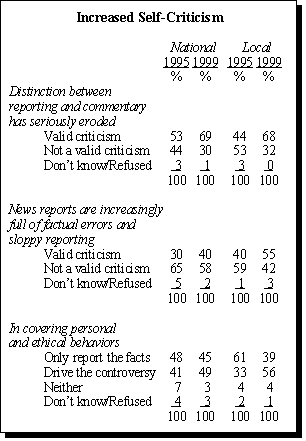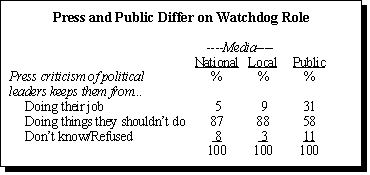Introduction and Summary
Journalists increasingly agree with public criticism of their profession and the quality of their work. Overwhelmingly, news media professionals say the lines have blurred between commentary and reporting and between entertainment and news. A growing number of reporters, editors and news executives also say that news reports are full of factual errors and sloppy reporting.

Across all mediums — print, television, radio and the Internet — the news media share public misgivings about their watchdog role. More of the news media today than just a few years ago say the press drives controversies rather than just reports the news in the way it covers the personal and ethical behavior of public figures. Clear majorities in the national and local press, for example, agree with the public that the Clinton-Lewinsky scandal was overcovered.
The impact of these shortcomings is not lost on the press. Lack of credibility is the single issue most often cited by the news media as the most important problem facing journalism today. Alarm about faltering credibility is far more prevalent in the current survey than in a comparable 1989 Center survey. Moreover, the press itself says that the loss of public trust is a leading cause of declining news audiences.
To reporters and editors, the reasons for journalism’s problems are just as clear — growing financial and business pressures. At both the local and national levels, majorities of working journalists say that increased bottom-line pressure is hurting the quality of coverage. This view is more common than it was just four years ago, although it is less often shared by media executives.
For all these changes and troubles, the news media continue to value traditional, high standards for accuracy, sourcing and objectivity. Across mediums, markets and generations, there is near unanimous agreement on the core principles that define journalism — getting the facts right, covering both sides and refusing to publish rumors. Moreover, most members of the press agree that journalism is distinguished because of its contributions to society, providing people with information they need.
These are the principal findings of a new Pew Research Center survey of 552 top executives, mid-level editors and producers, and working reporters and editors from both the national and local news media. The poll was conducted in association with the Committee of Concerned Journalists from November 20, 1998 to February 11, 1999. In addition to print, radio, and broadcast and cable television, a sample of those working in Internet news was also included. Unless otherwise noted, references to public opinion are from a February 18-21, 1999 poll, which can be found immediately following the results of the press survey.
Business Pressures Beleaguer Television
Increased concern about financial pressure is evident in both the print and television press, although it has grown more among those in television and radio, particularly national television.1 In this group, a 53%-to-38% majority of journalists and news executives say that pressure to make a profit is hurting the quality of coverage rather than just changing the way things are done. Opinion has reversed since 1995, when the national television media split 37%-to-46% on this question.
There are other indications that those working in television news find financial pressure particularly troublesome. They are more likely than their counterparts in print to cite quality issues as journalism’s top problem and to say that in order to attract new audiences, the news media crosses the line between entertainment and news.
While almost all news media respondents think that ownership of news organizations by diversified corporations has had a negative effect on their profession, most add that corporate owners have little influence on what is covered or emphasized. Similarly, few in the press report that advertising concerns play much of a role in news decisions.
Bosses Differ on Financial Pressure
The survey found that news executives and their staffs agree about the problems facing journalism, but executives are more defensive about the impact of financial pressures. At both the national and local levels, for example, fewer news organization chiefs than those in the newsroom ranks say the line is being crossed between entertainment and news.
Top executives are even more adamant about the general effects of the changed economic climate. Unlike their subordinates, clear majorities of news executives think that financial pressures are just changing the way things are done rather than reducing quality. Most mid-level editors and news staff disagree, especially in national news organizations.
Despite these important differences in opinion, most working journalists rate their leadership as excellent or good. Print journalists in national news organizations stand out for their positive views of their leadership: 47% say their bosses share their values a great deal, compared to 29% of national television journalists and roughly one-quarter of local news people.
Press and Public: Out of Touch
Most members of the news media concede that they are out of touch with the public, and they blame themselves more than the public for declining audiences. News media executives and journalists view the public not as uninterested or uninformed, but as feeling overloaded by news and information.
But Americans do not share this view. Two-thirds of the public says they like having so many information sources available; only 28% say they feel overloaded.2
The press also points to its loss of credibility with the public as a major reason for losing readers, viewers and listeners. About half of news media executives and journalists rank lack of credibility with the public as a major reason for declining audiences. This represents a significant jump since 1989, when only one-third of the press said this.
Americans’ evaluations of the news media’s credibility have declined since the mid-1980s. Network news believability is down an average of 11 percentage points; local television news has dropped 12 points and daily newspapers have tumbled 17 points since 1985.2
More people in local news organizations (46%) than national (31%) think that what the public is interested in should be given a great deal of consideration in news coverage decisions. While older members of the news media on both the local and national levels are more reluctant to take public interests into account, the public rewards the consideration given them by the local media.
Local television news tops the list of Americans’ favorite news sources — 64% of the public watches their local news regularly. Only 38% of the public regularly watches national network news.3
Press vs. Public on Watchdog Role
The press continues to value its watchdog role much more than the public does. Less than 10% of the news media — compared to nearly one-third of the public — believe press criticism of political leaders keeps those leaders from doing their jobs. The vast majority (more than 85%) think such criticism is worthwhile, because it keeps politicians from doing things that should not be done.

“As journalists, we are not just communicators, but watchdogs,” says a national cable news correspondent. “We are a very important part of this society’s system of checks and balances.”
The press and the public are more in sync in their criticism of how the media carries out its watchdog role. About half of journalists and media executives say that in reporting on the personal and ethical behavior of public figures, news organizations often drive the controversies rather than merely report the facts. Fully 72% of Americans say such reporting perpetuates scandal.
Other Findings
- Most journalists and news executives agree that they are overly focused on internal dynamics, too often competing with each other and writing more for colleagues than consumers.
- The press gives itself only lukewarm grades for striking the right balance between what audiences want to know and what is important for them to know. This criticism is especially strong in the national television news: Only 38% of those working in this arena say an appropriate balance is struck today, compared to 60% of the national print press and more than half of the local news media in both mediums.
- Two-thirds of those in national and local news say that news organizations’ attempts to attract readers or viewers has pushed them toward infotainment instead of news.
- Internet journalists share many values with those in the mainstream national news media, but there are some differences. While three-quarters of the national media say remaining neutral is a core principle of journalism, just 52% of those who work in Internet news agree.
- Journalists under the age of 35 are the least likely to know of official ethics programs within their news organizations and the most likely to want more of an organized effort.
Many people contributed to the development of this survey, which was funded jointly by the Pew Research Center and the Committee of Concerned Journalists. Bill Kovach, Tom Rosenstiel, Amy Mitchell, and John Mashek of the Committee provided invaluable insights into the issues journalists reckon with today, their values and perspectives.
The research team was led by Molly Sonner, whose focus and analytical integrity informed every stage of the project. Center analysts Kim Parker, Scott Nolde and Greg Flemming also played major roles in conceptualizing the survey and analyzing the data. The sample of journalists and news media executives was drawn by Lauren Lustig, Nilanthi Samaranayake and Charmaine Thompson, who also did the painstaking follow-up work necessary to complete the survey. This book and the charts and tables that enrich it were pulled together by Charmaine Thompson. Beth Donovan played a lead role in writing this report and carefully edited the entire document.




